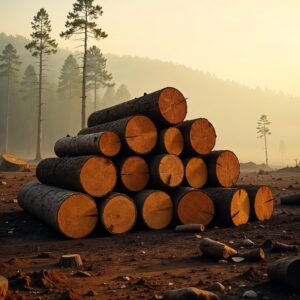Deforestation and Its Toll on Local Communities: A Silent Crisis

Deforestation, an environmental challenge with far-reaching consequences, continues to ravage ecosystems and displace communities in many parts of the world. While often discussed in the context of climate change and biodiversity loss, the human cost of deforestation remains a story less told. For local communities, particularly those in developing regions, deforestation represents more than a loss of trees—it signifies a threat to livelihoods, culture, and survival.
The Economic Lifeline Under Threat
Forests have long been the backbone of local economies in rural areas, providing food, fuel, medicine, and income to millions. In regions such as the Amazon, the Congo Basin, and Southeast Asia, communities rely on forests for subsistence agriculture, hunting, and foraging. However, large-scale deforestation—driven by logging, agriculture, and infrastructure projects—has disrupted this delicate balance.
Take the case of Uganda’s Mabira Forest, a critical source of resources for neighboring communities. The encroachment of sugarcane plantations has not only reduced the forest’s size but has also sparked violent conflicts. Families who depended on the forest for firewood or medicinal herbs now face dwindling resources and rising poverty.
A farmer from the area, James Okello, expressed his despair: “The forest was our bank. We used it when we were hungry, when we were sick. Now, we have nothing.”
Cultural Erosion and Displacement
For indigenous and forest-dependent communities, deforestation represents more than economic loss—it is an existential threat. Many indigenous tribes see forests as sacred spaces, integral to their spiritual practices and traditions. When forests are destroyed, these communities often lose not just their homes but their cultural identities.
The Batwa people, indigenous to the forests of East Africa, provide a stark example. Once referred to as “keepers of the forest,” the Batwa have been displaced due to conservation projects and illegal logging. Forced into resettlement camps, they struggle to adapt to agricultural lifestyles alien to their heritage.
“Without the forest, we are no longer Batwa,” lamented elder Tumushabe Kasiga. “Our songs, our dances, our stories—they were born in the trees. Now, they are fading away.”
Environmental Domino Effect
Deforestation’s impact on local communities extends beyond immediate economic and cultural loss; it triggers an environmental domino effect that exacerbates existing vulnerabilities. In Uganda’s Mount Elgon region, deforestation has led to increased soil erosion and landslides, leaving farming communities vulnerable to disaster.
“When the trees were here, they held the soil,” explained Agnes Nalongo, a resident. “Now, every time it rains, our crops are washed away. We are at the mercy of the elements.”
Additionally, the loss of forest cover disrupts water cycles, leading to reduced rainfall and prolonged droughts. For agrarian communities, these changes spell disaster. In the Lake Victoria Basin, deforestation has been linked to declining fish stocks, as reduced rainfall impacts water levels and aquatic ecosystems.
The Role of Corporate and State Interests
Large-scale deforestation is often tied to corporate and state-led initiatives. Logging companies, agribusinesses, and mining corporations, backed by government policies, prioritize short-term economic gains over long-term sustainability. This leaves local communities powerless in the face of powerful interests.
In Southeast Asia, oil palm plantations have driven deforestation at an alarming rate. Similarly, in Africa, the rise of commercial agriculture projects often comes at the expense of smallholder farmers. The lack of legal frameworks to protect community land rights only worsens the situation.
Stories of Resistance and Resilience
Despite the odds, many communities are fighting back. In Brazil, indigenous leaders like Sônia Guajajara have brought global attention to the plight of the Amazon’s defenders. In Kenya, grassroots movements such as the Green Belt Movement, founded by Nobel laureate Wangari Maathai, have empowered communities to replant forests and advocate for sustainable policies.
In Uganda, local NGOs are working with farmers to adopt agroforestry practices, integrating trees into farmland to restore degraded ecosystems while supporting livelihoods.
“We must protect what’s left,” said Robert Tumusiime, a conservationist. “If we lose our forests, we lose our future.
The Global Responsibility
While local communities bear the brunt of deforestation, its consequences ripple globally. Forests play a vital role in carbon sequestration, regulating the planet’s climate. Their destruction contributes significantly to global greenhouse gas emissions, fueling climate change that affects everyone.
As consumers, policymakers, and corporations, the responsibility to address deforestation lies with all of us. Sustainable supply chains, stronger land rights for communities, and investments in reforestation are critical steps in reversing the tide.
Conclusion
Deforestation is not just an environmental crisis—it is a human one. For the millions of people who depend on forests for their survival, its impacts are immediate and devastating. Beyond the statistics and satellite imagery are stories of resilience, loss, and hope.
As the global community debates climate change, the voices of those on the frontlines of deforestation must not be ignored. Protecting forests is not just about saving trees; it is about safeguarding livelihoods, cultures, and the planet we all share.